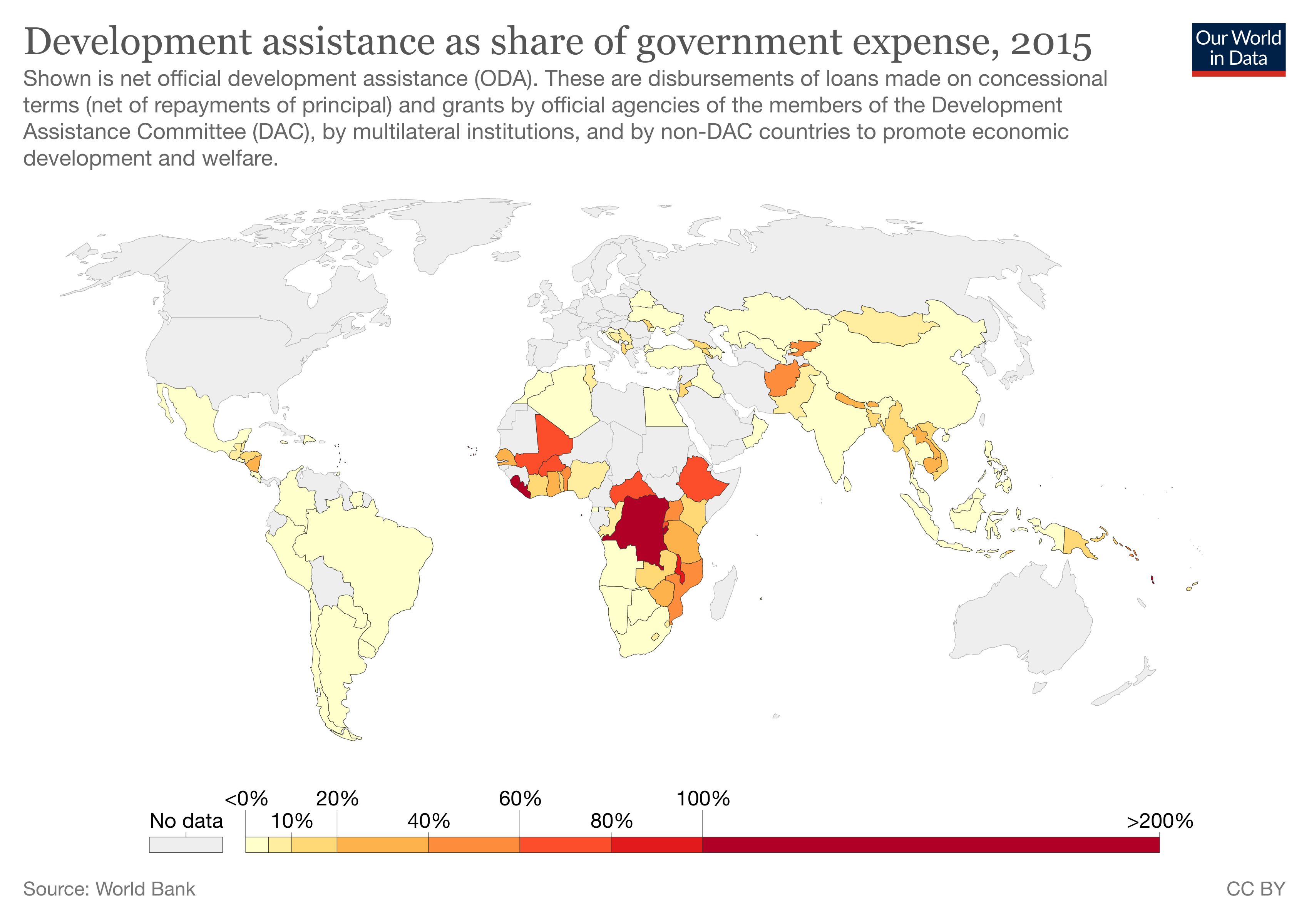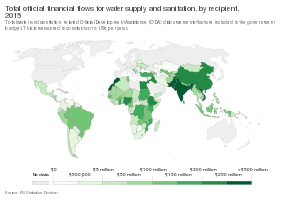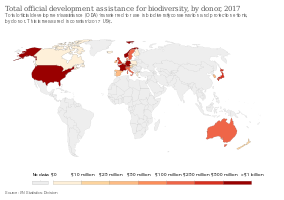
Development aid
Development aid is a type of foreign/international/overseas aid given by governments and other agencies to support the economic, environmental, social, and political development of developing countries.[1] Closely related concepts include: developmental aid, development assistance, official development assistance, development policy, development cooperation and technical assistance. It is distinguished from humanitarian aid by aiming at a sustained improvement in the conditions in a developing country, rather than short-term relief. Development aid is thus widely seen as a major way to meet Sustainable Development Goal 1 (end poverty in all its forms everywhere) for the developing nations.
Aid may be bilateral: given from one country directly to another; or it may be multilateral: given by the donor country to an international organisation such as the World Bank or the United Nations Agencies (UNDP, UNICEF, UNAIDS, etc.) which then distributes it among the developing countries. The proportion is currently about 70% bilateral 30% multilateral.[2]
About 80% of the aid measured by the OECD comes from government sources as official development assistance (ODA). The remaining 20% or so comes from individuals, businesses, charitable foundations or NGOs (e.g., Oxfam).[3] Most development aid comes from the Western industrialised countries but some poorer countries also contribute aid.
Development aid is not usually understood as including remittances received from migrants working or living in diaspora—even though these form a significant amount of international transfer—as the recipients of remittances are usually individuals and families rather than formal projects and programmes. Some governments also include military assistance in the notion of "foreign aid", although the international community does not usually regard military aid as development aid.
Types of development aid by source, channel and recipient[edit]
Non-ODA development aid[edit]
Analyses of development aid often focus on ODA, as ODA is measured systematically and appears to cover most of what people regard as development aid. However, there are some significant categories of development aid that fall outside ODA, notably: private aid, remittances, aid to less-poor countries and aid from other donor states.
$_$_$DEEZ_NUTS#0__titleDEEZ_NUTS$_$_$
$_$_$DEEZ_NUTS#0__subtitleDEEZ_NUTS$_$_$
$_$_$DEEZ_NUTS#0__call_to_action.textDEEZ_NUTS$_$_$$_$_$DEEZ_NUTS#2__titleDEEZ_NUTS$_$_$
$_$_$DEEZ_NUTS#2__descriptionDEEZ_NUTS$_$_$
History[edit]
Britain's development funding for its colonies[edit]
The concept of development aid goes back to the colonial era at the turn of the twentieth century, in particular to the British policy of colonial development that emerged during that period. The traditional government policy had tended to favor laissez-faire style economics, with the free market for capital and goods dictating the economic role that colonies played in the British Empire.
$_$_$DEEZ_NUTS#4__descriptionDEEZ_NUTS$_$_$
$_$_$DEEZ_NUTS#3__titleDEEZ_NUTS$_$_$
$_$_$DEEZ_NUTS#3__descriptionDEEZ_NUTS$_$_$
$_$_$DEEZ_NUTS#3__heading--0DEEZ_NUTS$_$_$
$_$_$DEEZ_NUTS#3__description--0DEEZ_NUTS$_$_$
$_$_$DEEZ_NUTS#4__titleDEEZ_NUTS$_$_$
Proposed good practices[edit]
The following proposals have been made about good practice in development aid.
For aid to work well, donors need to invest heavily in staff who maintain sustained relationships with counterparts in recipient countries, in order to deal intelligently and flexibly with the complex difficulties involved.[92]
Public accountability of aid is important, both for the sake of democratic citizenship in recipient countries, and for realistic and sustainable attitudes to aid in donor countries.[92]
Effectiveness and anti-corruption measures:
General:
Tools and stories:
$_$_$DEEZ_NUTS#6__titleDEEZ_NUTS$_$_$
$_$_$DEEZ_NUTS#6__subtextDEEZ_NUTS$_$_$
$_$_$DEEZ_NUTS#8__titleDEEZ_NUTS$_$_$
$_$_$DEEZ_NUTS#8__subtextDEEZ_NUTS$_$_$
$_$_$DEEZ_NUTS#5__titleDEEZ_NUTS$_$_$
$_$_$DEEZ_NUTS#5__subtextDEEZ_NUTS$_$_$
$_$_$DEEZ_NUTS#7__titleDEEZ_NUTS$_$_$
$_$_$DEEZ_NUTS#7__subtextDEEZ_NUTS$_$_$
$_$_$DEEZ_NUTS#1__titleDEEZ_NUTS$_$_$
$_$_$DEEZ_NUTS#1__subtextDEEZ_NUTS$_$_$
$_$_$DEEZ_NUTS#1__answer--0DEEZ_NUTS$_$_$
$_$_$DEEZ_NUTS#1__answer--1DEEZ_NUTS$_$_$
$_$_$DEEZ_NUTS#1__answer--2DEEZ_NUTS$_$_$
$_$_$DEEZ_NUTS#1__answer--3DEEZ_NUTS$_$_$
$_$_$DEEZ_NUTS#1__answer--4DEEZ_NUTS$_$_$
$_$_$DEEZ_NUTS#1__answer--5DEEZ_NUTS$_$_$
$_$_$DEEZ_NUTS#1__answer--6DEEZ_NUTS$_$_$
$_$_$DEEZ_NUTS#1__answer--7DEEZ_NUTS$_$_$
$_$_$DEEZ_NUTS#1__answer--8DEEZ_NUTS$_$_$
$_$_$DEEZ_NUTS#1__answer--9DEEZ_NUTS$_$_$
$_$_$DEEZ_NUTS#1__answer--10DEEZ_NUTS$_$_$
$_$_$DEEZ_NUTS#1__answer--11DEEZ_NUTS$_$_$
$_$_$DEEZ_NUTS#1__answer--12DEEZ_NUTS$_$_$
$_$_$DEEZ_NUTS#1__answer--13DEEZ_NUTS$_$_$





